The Left (Germany)
Die Linke (proper spelling: DIE LINKE; also known as the Left Party or Die Linken) is a left-wing democratic socialist party in Germany.
The Left Party was formed on 16 June 2007 by merging the SPD spin-off WASG and the Left Party.PDS. The latter had emerged in June 2005 from the renaming of the SED successor party PDS, which took place "in the interest of a new nationally active left in Germany". In order to represent both parties and their origins in East and West Germany in the executive committees, the equal "dual leadership", which has been maintained until today, was elected. The party's current manifesto was adopted in 2011. In the current 19th German Bundestag, the parliamentary group Die Linke is the second smallest parliamentary group in the Bundestag. The two leaders of the parliamentary group are Amira Mohamed Ali and Dietmar Bartsch.
In the eastern German states, the Left Party is represented in all state parliaments. In Brandenburg, it was a junior partner in a red-red coalition from 2009 to 2019 (Woidke I cabinet and Woidke II cabinet), and in Thuringia it has been the prime minister in a German state for the first time since 2014 with Bodo Ramelow - interrupted by the government crisis in 2020 - in a red-red-green coalition. In Berlin, it has also been in government since 2016 in a red-red-green coalition - but under the leadership of the SPD. In the parliaments of the West German states it is represented in Hamburg, Hesse, Saarland and Bremen, whereby in Bremen since August 2019 in a red-green-red government under SPD leadership for the first time in a West German state.
In the GUE/NGL group in the European Parliament, it is the party with the third most MEPs and provides the group leader with Martin Schirdewan, who was also the top candidate of the Left Party in the European elections in Germany in 2019. It is a member of the European Left and participates in the Forum of the New European Left (NELF).
Profile
Tradition
The party sees itself "in a party-political line of tradition that goes back to Rosa Luxemburg and Karl Liebknecht". Lothar Bisky declared on 16 June 2007 at the Left Party Congress that Die Linke sees itself in the tradition of former Chancellor Willy Brandt and his motto "Dare more democracy", with which he wanted to overcome the domestic political stagnation of the post-war period in Germany. At the founding party conference, Oskar Lafontaine classified Die Linke historically as follows: "It stands in the tradition of those who were persecuted under Bismarck's socialist laws, and it stands in the tradition of those who perished in Hitler's concentration camps, and it feels obliged to the legacy of those who were imprisoned as social democrats in the GDR as well as the communists who were imprisoned and persecuted in the Federal Republic of Germany. Both belong together, and both must be said." As a starting point for its policy, Die Linke cites the Basic Law for the Federal Republic of Germany, in which it recognizes a call to "democratic socialism."
Program
On 24 and 25 March 2007, at the joint party conference of the Left Party and the Labour & Social Justice Party - The Electoral Alternative (WASG) in Dortmund, key programmatic points for the new Left Party were adopted. The document contains some basic positions of the Left Party and cornerstones of its policies. The Left wants to achieve "social, democratic and peacemaking reforms to overcome capitalism".
On 20 and 21 June 2009, the party's Bundestag election programme was adopted at the 2009 Bundestag election party conference in Berlin. The Programmatische Eckpunkte took on the legal role of the party programme prescribed by law for a party, but in terms of content represented only a programmatic paper, albeit a comprehensive one. On 23 October 2011, at the Erfurt party congress, the first party programme was adopted with 503 votes in favour, 4 against and 12 abstentions. This corresponds to an approval of 96.9 percent. In the membership referendum from 17 November to 15 December 2011, the party programme was confirmed with a quorum of 95.8 per cent.
economic and fiscal policy
In wage policy, Die Linke advocates an increase in wages and salaries within the framework of annual productivity growth and the target inflation rate of the European Central Bank, to be negotiated at macroeconomic level through area-wide collective agreements.
Public investment and other spending on education, research, culture, ecological restructuring and public infrastructure should be increased by at least 40 billion euros a year. Larger companies are to pay significantly more taxes overall, while Die Linke calls for possibilities of higher depreciation for investing companies. The wealth tax, which has not been levied since 1997 due to the unconstitutionality of the former version of the law, is to be reintroduced and the inheritance tax on large inheritances is to be increased. As far as income tax is concerned, Die Linke calls for the introduction of a linear tax scale to ease the burden on middle and lower incomes, and for raising the top tax rate to 50% or more, which would amount to a partial reversal of the 2000 tax reform. In addition, the focus is on the elimination of tax-saving opportunities which, according to the Left, particularly favour the wealthy and high earners.
The financial markets are to be subjected to greater state control, with the aim, among other things, of restricting securities and currency speculation. By tightening antitrust legislation, the party wants to decentralize and further divide private economic power. In return, cooperatives and other forms of solidarity-based economy are to be promoted.
The reduced tax rate of seven percent is to be introduced on all products and services for minors, on pharmacy-required medicines, labour-intensive craft services and in the hotel and restaurant industry.
In the long term, the party wants to transfer "structurally decisive large-scale enterprises of the economy" into social ownership (state or municipal ownership, cooperatives, employee ownership) and give employees democratic control over the enterprises, but rejects "all-encompassing state ownership".
Social policy
Representatives of the party describe the social policy of the current and past governments as "social dismantling". Social risks should be sufficiently covered, a certain standard of living in old age should be guaranteed. In order to achieve these goals, Die Linke demands the withdrawal of all laws of the Hartz reforms, especially the fourth stage (popularly known as "Hartz 4"). Instead, it wants to tie the social security systems to the state by strengthening their solidarity-based elements and by renewing self-administration. The Left Party also advocates a "repression-free" and means-tested basic income support for people threatened by poverty. The compulsion to take up work through punishments with benefit cuts below the socio-cultural subsistence minimum are rejected.
The Left Party demands higher wages and the prevention of old-age poverty through rising pensions. The statutory pension insurance is to be transformed into an insurance for employed persons, gradually including members of all occupational groups. Pensions in the new Länder are to be raised to the level of the old Länder. Raising the retirement age to over 65 is rejected. Instead, flexible exit options before the age of 65 and a retirement age of 60 without deductions are sought.
Child poverty is to be counteracted by increasing child benefit to 200 euros.
The party criticizes the three-tier school system. The financing and additional provision of apprenticeship places for young people is to be financed by a training place levy on non-training companies.
In the health care sector, Die Linke, like the SPD, advocates a citizens' insurance system with equal co-financing by employers. The party criticizes "profit-oriented structures" in the health care system.
The Left Party considers the following points to be particularly important:
- Better cooperation between doctors, hospitals and all service providers
- Promotion of health centres, centralisation of health services
- Introduction of a state-established positive list for prescription-only medicines
- Higher pay for medical and nursing staff
- Stronger rights for patients
The Left Party advocates the preservation and expansion of public services of general interest and the safeguarding of local self-government. The sale of public property in housing and utilities is to be prevented. The right to housing should be included in the Basic Law.
Labour market policy
The Left wants to enable workers to exercise what it sees as a deprivation of self-determination and stresses the importance of solidarity, criticising an exclusively competitive orientation of the economic system.
The main points are:
- Reduction of working hours;
- new jobs through ecological and social restructuring;
- publicly supported and designed employment sectors;
- an active labour market policy focusing on those who have particularly poor chances on the labour market;
- a productivity-oriented wage policy (i.e. real wages rise in step with labour productivity);
- a statutory minimum wage at a living wage level;
- full social protection of all employment relationships and humanisation of work;
- Validity of domestic social standards for all those working here;
- Awarding public contracts to companies that comply with high social and environmental standards at home and support the improvement of these standards on a global scale.
In order to achieve these goals, Die Linke actively seeks cooperation with the trade unions.
Domestic politics and understanding of democracy
In the "fight against international terrorism", the left notes more and more restrictions on democracy and the dismantling of fundamental rights and freedoms. Criticism is levelled at international organisations (especially NATO) and also European institutions. The spreading of mistrust and suspicion, especially towards followers of the Islamic faith, is to be countered by a "culture of dialogue and cooperation".
The left wants to build an "economic, political and cultural order of societies based on democratic decisions" and also to let the population participate democratically in its development.
Civic co-determination is to be more closely integrated into parliamentary democracy. The party thus seeks a close link between parliamentary and direct democracy, which is to be made possible by introducing nationwide referendums and plebiscites. Democratic participation is also to be strengthened through planning, control and objection rights for environmental organisations, consumer associations, trade unions, associations and other civil society forces as well as citizens. The Left Party also proposes the introduction of so-called participatory budgets: Citizens should be allowed to directly co-decide on the budget of their municipality for the purpose of more active co-determination. The Left Party is guided by the scientific concept of the citizens' municipality and calls for the expansion of the position of the municipalities in the federal system.
The democratization process should also include the strengthening of individual rights. State action is to be verifiable by a new independent control authority - this task has so far been performed by the courts. In this way, each individual is to be protected from unjustified encroachments by the state. This also includes the right to determine one's own data and its use (informational self-determination). The strict separation of the police and the Bundeswehr as well as the police and the secret services is firmly adhered to. The party rejects an amendment to the Basic Law that would allow the deployment of the Bundeswehr in Germany.
The Left strives for social control over all forms of economic power. Through equal co-determination of employees, their trade unions and representatives of the regions and consumers, financial power is to be subordinated to democratic interests. In addition, the political strike and the general strike are to be made possible.
The concept of equality is to be extended to include the characteristics of origin, gender, sexual identity, disability, ethnic and religious affiliation. All people living and working in Germany and the European Union are entitled to the same rights, according to the Left. In order to guarantee this, an effective and comprehensive anti-discrimination law is demanded, which goes beyond the existing one and includes the possibility of associative action. In addition, the right to vote should be extended to all people living in Germany. The Left Party promotes a harmonisation of asylum law in Europe.
Immigrants from different cultural backgrounds living in Germany are seen as an enrichment and the integration of the immigrant population is seen as a social challenge. For the minorities living on German territory, an expansion of their participation rights and appropriate public support for the preservation and further development of their languages and cultures is demanded. Right-wing extremism should therefore be more strongly outlawed and fought politically. This includes in particular the "intensification of anti-fascist educational work". Therefore, civil society structures against right-wing extremism are to be strengthened by expanding financial support for corresponding initiatives and advisory teams. The Left Party wants to devote greater attention to the observation of right-wing extremism in an international context.
The constitutional state is to be restructured according to social and solidarity aspects, which is to aim at a change in the relationship between state, economy and society. The requirement of the welfare state is to be concretized by establishing the principles of social justice and the requirement of state protection against the most important risks of life. This includes ensuring a fair distribution of society's wealth. Basic social rights should also be included in the Basic Law in order to enforce the welfare state.
Environmental policy
The party's desired economic policy is oriented towards the common good and environmental protection. The goal is the unity of social, ecological and economic sustainability. For example, a system of taxes and levies is to be developed that promotes environmentally friendly action and places a burden on environmentally damaging behaviour.
The primary goal of an ecological transformation is the decentralization of power generation and supply. To this end, the electricity grids should be nationalised. According to the Left Party, increasing energy efficiency, reducing energy consumption and focusing on renewable energies are necessary to solve the energy problems. The party also wants to accelerate the phase-out of nuclear power. In addition, the export of nuclear technology is firmly rejected.
Other goals of the Left's environmental and nature conservation policy are:
- Sustainable use of natural resources and comprehensive environmental education
- Environmentally sound regional economic cycles
- Expansion of organic farming and forest management
- Designation of further nature reserves and landscape protection areas as well as a comprehensive biotope network
- Reduction of environmentally harmful subsidies in favour of funding for environmental and nature conservation measures
- consistent implementation of the European nature conservation directives and provision of the necessary funds in public budgets
- to press ahead with the implementation of the National Strategy on Biological Diversity and to increase the annual budget for this to 50 million euros
- Minimise landscape fragmentation of existing motorways by means of wildlife bridges
- comprehensive rights of information, participation and action for citizens as well as for environmental and nature conservation associations
- Promotion of targeted renaturation measures
- to give priority to environmental compatibility in construction measures
- general ban on animal testing
- Limitation of land consumption through sealing
In a joint comparison of environmental policy demands of the parties represented in the Bundestag by the youth organisations of NABU and BUND, there was one hundred percent agreement between the positions of Die Linke and those of NABU and BUND.
Agricultural policy
The Left Party calls for an "agricultural policy oriented towards the common good". The ecologically harmful and socially unjust subsidy policy of the EU's Common Agricultural Policy must be ended. The export-oriented and profit-maximising orientation of agriculture should give way to local cycles and industrial agriculture to peasant agriculture. Land grabbing should be consistently banned and non-agricultural investors excluded from the acquisition of agricultural land, as they put further pressure on producer prices.
Organic farming should be massively promoted and structural diversity in agriculture gained through landscape elements such as hedges, small bodies of water or dry stone walls and through a diverse cropping structure. The Left Party is in favour of area-based animal husbandry and against factory farming. In addition, the Left Party is in favour of a general ban on green genetic engineering, as well as a general right to farm from seed and against patents on seed.
The Left Party regularly takes part in the "We're fed up with it!" demonstrations, which speak out "against the agricultural industry, against factory farming and for an agricultural turnaround".
Transport policy
The party is committed to an "ecological transport turnaround". The privatisation policy in the transport sector is to be ended, and local public transport is to be improved by new offers. Freight transport is to be concentrated more on the railways. Kerosene for the operation of aircraft is to be taxed.
The party calls for a withdrawal of the gradual taxation of biofuels, as this hinders the development of climate-friendly fuels. At the same time, efforts should be made to ensure that biofuels are only produced sustainably and that only sustainably produced fuels are imported.
The Left Party advocates free public transport throughout the country. To this end, a three-phase model with a three-year development period was presented.
European policy
The Left takes a critical view of the current structure and political orientation of the European Union. The party has set itself the goal of strengthening the democratic, social, ecological and peace policy dimension. New goals are to be set for the European Union. A "militarization" of the EU is strictly rejected by the party and the dissolution of the US military bases in Europe is demanded.
The ratification of the Lisbon Treaty was rejected with reference to military policy and neoliberal economic policy liabilities. From the party's perspective, the treaty leads to a militarisation of the Common Foreign and Security Policy. The neo-liberal orientation of the treaty text and the envisaged type of enhanced cooperation between police and security services are also criticised. Ultimately, the euro crisis proves the inadequacy of the existing EU treaties. Therefore, the primary legal foundations of the EU should be comprehensively renewed in a constitution with the participation of the citizens of the Union.
The Left advocates the anchoring of a social progress clause in EU primary law, calls for the unification of the corporate tax base and an EU-wide minimum tax rate for corporate profits. The independence of the European Central Bank should be given up for the purpose of democratic control, in order to be able to work for employment and sustainable development alongside price stability.
The Left Party votes against the European Fiscal Compact and the European Stability Mechanism and demands a referendum. Former parliamentary group leader Gregor Gysi justified this, among other things, with the fact that with the ESM "the most important economic policy instruments (...) that are necessary to maintain social state guarantees" would be put at risk.
However, the left is in favour of Eurobonds, in which the member states are mutually liable for each other.
Foreign Policy
The Left addresses four areas in the field of foreign policy: Defence policy, world economic policy, democratisation of the UN and the European Union.
The party calls for a policy of disarmament. Through social justice, realization of human rights, sustainable development and democracy, the party wants to achieve stability and peaceful cooperation. Foreign deployments of the Bundeswehr are generally rejected. The party demands that NATO be dissolved and replaced by a collective security system with the participation of Russia, and that German foreign policy be strictly oriented towards civil conflict resolution and cooperation instead of confrontation.
The Left demands comprehensive debt relief for poor countries and an increase in development aid. To this end, the party wants to exert appropriate influence in the United Nations, the WTO and the World Bank, as well as through bilateral treaties and European agreements with Latin America, Africa and Asia.
The UN is to be democratized and strengthened by upgrading the General Assembly and restructuring the Security Council. The aim is to be able to shape a fairer world economic and social order. In addition, The Left advocates that abductions, secret prisons and torture be outlawed worldwide beyond the current agreements.
According to the resolution of the party's Federal Committee of 21 September 2008, the party's attitude of solidarity towards "progressive movements" in Latin America "finds its concrete expression in particular in the continuation of the political and material solidarity campaigns of the Cuba Sí working group".
The Left Group advocates lifting the ban on the socialist Kurdistan Workers' Party (PKK).
Attitude towards Israel
The Left Party recognizes Israel's right to exist. However, individual members of the Bundestag faction and parts of the party base strongly criticize Israel's Palestine policy. In 2011, political scientist Samuel Salzborn and historian Sebastian Voigt described anti-Israel and anti-Semitic tendencies in the party in an essay. The essay, first published in the Frankfurter Rundschau, later appeared somewhat revised in the Zeitschrift für Politik. The essay was the occasion for a special hour in the Bundestag requested by the CDU/CSU and FDP. Some members of the party leadership were critical of the tendencies described, others denied them.
In a response in the same journal, sociologist Peter Ullrich and political scientist Alban Werner (the latter a member of the Left Party) criticized the authors for failing to prove radical hostility to Israel or anti-Zionist anti-Semitism. In many respects, the essay did not meet basic scientific criteria and was methodologically flawed, inconsistent and did not discuss divergent interpretations of the material presented. On the basis of an online survey, Maximilian Elias Imhoff contradicted Ullrich and Werner: around 30 percent of the radical leftists surveyed had not been free of anti-Semitic ideas or had not been able to clearly distinguish themselves from anti-Semitic resentment.
Due to the "toilet affair", there was again a public debate in 2014 about the party's attitude towards the state of Israel, which also led to an internal party dispute. In particular, the members of the Bundestag Annette Groth, Inge Höger and Heike Hänsel came under criticism.
Family policy
In the area of family policy, Die Linke is particularly concerned with gender equality. To this end, it seeks an additional equality law for the private sector. Special programmes for the advancement of women are also to be introduced. The Left Party criticizes the unequal pay for the work of both sexes. The reconciliation of family and career is to be improved by expanding all-day facilities.
Section 218 of the German Penal Code (StGB), which permits abortion only under certain conditions, is to be abolished and abortion thus completely legalised. The "morning-after pill" is to be made available more quickly by abolishing the requirement for a prescription. The exemption from punishment of abortion against the will of the pregnant woman, which is also regulated in § 218 StGB, is not politically connected with this demand. Violence against women should be publicly outlawed and resolutely prosecuted.
The Left Party wants to make it easier for couples to raise children - regardless of the type of relationship in which they live together. It welcomed the opening of marriage for same-sex couples. In addition, it calls for further steps to ensure equal rights for all lifestyles: The party calls for a system of elective affinities, in which communities of more than two people are also recognized as connected. The Left Party wants to guarantee such communities similar rights to those enjoyed by married couples, including visitation rights in the event of illness, adoption rights and the right to refuse to testify.
Marital splitting is to be abolished.
The party opposes the childcare allowance and justifies its position, among other things, by arguing that this social benefit encourages mothers - in line with the traditional ("outdated") image of the family - to stay at home instead of entering the workforce, and that children are limited in their educational and developmental opportunities due to the lack of early social contacts. A basic child allowance should replace the childcare allowance in order to enable children to grow up without financial insecurity.
Net Policy
In the position paper Digital Democracy instead of the Rule of Monopolies at the end of 2019, the politicians of the Left Party Katja Kipping, Anke Domscheit-Berg and Katalin Gennburg formulated which interests the digital economy was pursuing that ran counter to the ideals of a democracy. The term is intended to draw attention to the continuing power of digital monopolies and to add a democratic and social component to the discussion.
The position paper Digital Democracy instead of the Rule of the Monopolies proposes a New Deal that aims at the following points:
- Creating order through digital regulatory law,
- fair taxation of Internet companies,
- Creating Data Sovereignty (Digital Freedom),
- Allow data migration between different vendors,
- Formation of a Social Innovations Fund for alternatives to the monopolists.
Research and education policy, press
The party wants to implement equal opportunities by having the state offer education free of charge, from daycare to university. In addition, it wants to achieve "free all-day care in day-care centres and schools, including a full, healthy lunch".
The Left Party wants to put pre-school education in the foreground, make its importance clear and promote it in a special way. Subsequent joint school attendance is to be extended. To this end, the party wants to create an integrative comprehensive school that covers the school years one to at least nine. Furthermore, the party formulates the goal of focusing on the individual promotion of each individual.
In the field of education, the party demands a basic right to an apprenticeship for every school leaver.
Universities are to be democratised by reducing profit-oriented influence, expanding public funding and introducing tripartite self-administration. In addition, access to all degrees should remain free, and the transition from vocational training to higher education should be facilitated. Tuition fees are strictly rejected.
Basic research should be strengthened. The Left advocates a balanced relationship between theoretical and application-oriented research and teaching, the dismantling of hierarchical structures and greater independence for the academic middle classes. Patents on genes of living beings or parts of living beings, especially humans, are rejected. The Open Access and Open Source movements are welcomed by the Left.
In addition, the lack of funding for continuing education is criticized. The goal is a federal law on continuing education.
By means of stricter anti-trust legislation, it wants to prevent monopolisation in the media sector and in this way preserve press freedom and press diversity. The rights of authors vis-à-vis collecting companies are to be strengthened; at the same time, a balance is to be found so that non-commercial use is restricted as little as possible.
Support for the new Länder
The party plans an all-German innovation, investment and structural policy to reduce the differences between the old and new federal states.
The Left emphasizes the advantages of the GDR's real socialist system. It sees childcare, the school and education system, the economic equality of women with men and local cultural institutions in the former GDR as exemplary and contradicts the general and uncritical adoption of corresponding structures of the Federal Republic.
Specifically, The Left pursues the following goals:
- "Equal pay for equal work"
- Livable conditions in the East in the areas of education, culture, leisure and childcare.
- Concentration on economic sectors of importance in the regions through specific regional development concepts; cooperative interlinking of growth centres (structurally weak, rural and peripheral areas).
- Promotion of future industries and companies, planning security for the disposal of funds from the EU, the federal budget and the Solidarity Pact; only minimally co-finance subsidies for financially weak Länder.
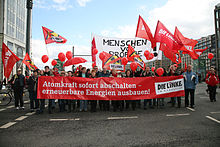
Participation of the party Die Linke in the large demonstration against nuclear power in Berlin
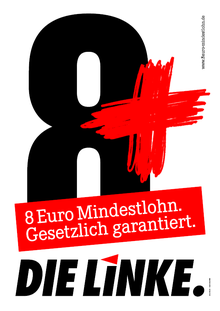
Poster 2006 demanding 8 € minimum wage. The level of the minimum wage demanded has been adjusted several times since then.
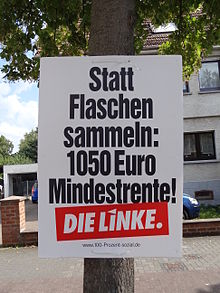
Poster for the federal election 2013
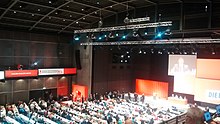
The 2015 Federal Party Congress in Bielefeld.
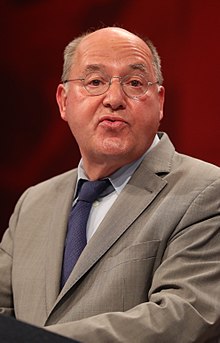
Gregor Gysi, former mayor and senator for economics, labor and women's affairs of the state of Berlin and from 2005 to 2015 parliamentary party leader of the Left Party in the German Bundestag - also leader of the opposition from 2013 to 2015
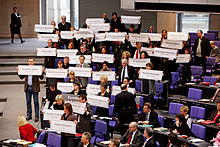
On 26 February 2010, around 50 of 76 members of the Left Party in the German Bundestag demonstrated against the deployment of the German Armed Forces in Afghanistan, for which reason they were excluded from the rest of the session by the President of the Bundestag, Norbert Lammert, for violating the rules of procedure.

Criticism of the G7 Foreign Ministers Meeting in Lübeck
History
The Left Party emerged from the merger of the PDS, which until 1989 functioned as the communist state party of the German DemocraticRepublic under the name Socialist Unity Party of Germany (SED), and the WASG, which was initially founded as an association in 2004 by SPD members and trade unionists critical of the government.
History of the PDS part
→ Main articles: History of the SED (1946-1990) and History of the PDS (1990-2007).
PDS (2005-2007)
The PDS had emerged from the Socialist Unity Party of Germany, which in turn had been founded in 1946 in the course of the forced unification of the SPD and KPD in the Sovietoccupation zone and Berlin. From 1949 to 1989, the SED was the ruling state party of the GDR. During the fall of communism in 1989/90, the party first changed its name to SED-PDS, and on 4 February 1990 - after more than two-thirds of its members had left the party, most of its top personnel had been replaced, and its programme had changed - it was renamed the Party of Democratic Socialism (PDS). On 17 July 2005 the party was renamed Linkspartei.PDS.
The PDS was initially chaired by Gregor Gysi. In the first free elections to the People's Chamber in the GDR on 18 March 1990, it achieved 16.4 %. In the first all-German Bundestag election in 1990 it achieved 2.4 %. Since East and West had formed separate electoral districts and with 11% in the East the five-percent hurdle was overcome, the PDS was initially represented with 17 deputies. It had won one East Berlin constituency directly. In the state elections in the new federal states of Thuringia, Saxony, Saxony-Anhalt, Brandenburg and Mecklenburg-Western Pomerania as well as in Berlin, it was also successful with between 10 and 15 % in each case. In 1993 Lothar Bisky replaced Gysi as chairman. In the 1994 federal election, the party increased its result to 4.4 %. Since it won four direct mandates in East Berlin, it entered the Bundestag again, this time with 30 deputies. In the East German Länder, the PDS increasingly developed into a people's party and from the mid-1990s onwards usually achieved election results of over 20 %. Around the turn of the millennium, it became in some cases the second strongest party there.
In the 1998 Bundestag elections, the party overcame the five-percent hurdle for the first time with 5.1 % and was able to claim parliamentary party status in the Bundestag. Bisky resigned from the federal chairmanship in 2000; Gabi Zimmer became his successor. In the East, the PDS had meanwhile become the people's party, but in the West its popularity was still low; it did not achieve more than respectable successes there, although it was able to win over a few former SPD voters. After it had failed the hurdle with 4.0 % in the 2002 Bundestag election and two electoral districts in East Berlin leaning towards the PDS had been merged with districts in West Berlin, it was represented exclusively by two directly elected members of parliament. In 2003, Gabi Zimmer resigned in the course of a serious internal party crisis - triggered by the missed election in 2002 - and Bisky became chairman again. In the super election year 2004 a consolidation occurred. In the course of the protests against Agenda 2010 and especially the Hartz reforms, the PDS achieved its best election results since the end of the GDR.
The History of the SED in the Left's Culture of Remembrance
The history and the past of these two parties and their predecessor organisations up to their merger is part of the history of the party Die Linke. The political roots reach beyond the SED, PDS and SPD to the KPD, VKPD, USPD, Spartakusbund, SDAP, ADAV and the German labour movement.
Legally, the SED, PDS, Left Party and Die Linke are the same legal entity. Because of the clear political, programmatic and personal differences, the term "successor party" is sometimes used. The Left sees itself as the "legal successor of the SED" and deals with the history and the resulting inquiries and accusations. Similar to the PDS, a historical commission was also established in the party Die Linke. In addition to the general history of the labour movement, the trade unions, social democracy and communism, the commission focuses on the history of the GDR and the SED. Members include historian and GDR oppositionist Thomas Klein, historian Mario Keßler, both of the Center for Contemporary History Research in Potsdam, economic historian Jörg Roesler, and Bundestag member and historian Jan Korte.
Parts of the public accuse the Left of tolerating former employees of the Ministry for State Security (MfS) in higher offices. Thus, former MfS employees sat and still sit for the PDS and Die Linke in parliaments from the local to the federal level.
Allegations of MfS activity exist against high-ranking members of the party, such as the former party chairman Bisky or the parliamentary group chairman in the Bundestag Gysi, which, however, could not be legally proven. The Left Party MP Lutz Heilmann was also the first full-time employee of the Ministry for State Security to sit in the Bundestag. In 2009, media reports in Brandenburg only revealed the MfS activities of three Left Party members of parliament after the state elections. The number of former MfS employees in the parliamentary group thus increased to seven; the MfS activities of four other Left Party MPs were already known before the election. This led to discussions about the continuation of the red-red state government.
As early as the beginning of the 1990s, the PDS debated how to deal with former employees of the MfS. After the disclosure of the Stasi activities of the former Berlin party chairman Wolfram Adolphi, a Berlin state party congress adopted a motion entitled "On the consistent, open and public confrontation with the problem of state security". The motion stipulated that party members who had cooperated with the MfS had to disclose this activity before assuming a party office or a mandate in the people's representatives. If a member failed to comply, he or she was to be expelled from the parliamentary group. The federal party later adopted the Berlin resolution. After problems with the implementation and discussions in the party, already the next party congress relaxed the regulation. Since then, an undisclosed MfS activity is no longer automatically followed by exclusion from the electoral body. Instead, a party body, for example a party congress or executive committee, decides on further steps. For example, Lutz Heilmann narrowly survived a vote of confidence in his state association after his activities for the MfS became known and was not expelled from the Bundestag faction. In Brandenburg, former employees of the MfS who had not made this known before the election were asked to renounce their mandate. The deputies concerned complied with this demand or were otherwise expelled from the parliamentary group.
The founding of the German Democratic Republic is seen as a legitimate attempt "to prevent a resurgence of social driving forces of National Socialism after the Allied victory over Nazi Germany" and to "build a socialist state on German soil", although the attempt is described as a failure. The failure is justified by internal reasons such as the lack of democracy, the disregard for civil rights and a flawed economic system, as well as external reasons such as the bloc confrontation and the Cold War.
Dealing with the history of the GDR and with the history of one's own party sometimes ignites conflicts within the party as well as conflicts with third parties. For example, the description of the GDR as an unjust state is highly controversial within the party and is rejected by the party leadership. The Thuringian state party, on the other hand, accepted the designation in coalition negotiations with the SPD and the Greens.
History of the WASG part
→ Main article: History of the WASG
In protest against the Agenda 2010 adopted in 2003 by the SPD under Chancellor Gerhard Schröder, the Wahlalternative 2006 (Electoral Alternative 2006), led by the economist Axel Troost, and the Initiative Arbeit und soziale Gerechtigkeit (Initiative for Work and Social Justice), led by the trade union official Klaus Ernst, who had previously been a member of the SPD, formed in early 2004, initially independently of each other in northern Germany. In July of the same year, the two organizations merged to form the Electoral Alternative for Work and Social Justice (WASG).
In January 2005, the party Arbeit & soziale Gerechtigkeit - Die Wahlalternative (ASG) emerged from the association. Since the abbreviation ASG was already taken, the newly founded party had to change its abbreviation to WASG. In May it ran in the state elections in North Rhine-Westphalia. There it unexpectedly achieved a respectable success with 2.2 %.
A few days later, Oskar Lafontaine resigned from the SPD, after an increasing estrangement between him and the party had already developed since his resignation as Federal Finance Minister in March 1999. Lafontaine, who had already made known his sympathies for the WASG, considered an alliance of PDS and WASG for the early Bundestag elections, which finally came about two months later.
Merger process (2005-2007)
Before the merger, the PDS was rather anchored in East Germany. The process of forming an all-German left-wing party began in 2004, when SPD members and trade unionists critical of the government initially founded the more West German-oriented Wahlalternative Arbeit und soziale Gerechtigkeit (Electoral Alternative for Work and Social Justice), which was transformed into the WASG party in January 2005.
In June, the PDS and WASG agreed not to compete in the 2005 Bundestag elections. Gysi and Lafontaine, who later became party leaders, were elected as top candidates.
In July, the PDS changed its name to Linkspartei.PDS. In the election on 18 September 2005, the left-wing alliance achieved 8.7 % of the votes and thus became the fourth strongest force in the Bundestag. The elected parties formed a joint parliamentary group in the Bundestag.
Finally, on 16 June 2007, the merger party conference of Die Linke took place in Berlin. At the vote there on the founding of the party, one delegate voted against, two abstained.
In 2006, the WASG contested the state elections in Baden-Württemberg, Rhineland-Palatinate, Berlin and Mecklenburg-Western Pomerania, but failed everywhere to clear the five-percent hurdle. In March 2007, at a double party conference of the Left Party.PDS and the WASG in Dortmund, the course was finally set for a merger. 96.9% of the delegates of the Left Party and 87.7% of the WASG voted for the merger. In a subsequent ballot, 96.9% of Left Party members and 83.9% of WASG members voted for the merger. On 16 June 2007, the WASG, which had been independent until then, merged with the Left Party.PDS, although there was some opposition to the procedure within the party.
Electoral successes (2007-2010)
The party initially recorded a number of electoral successes. One month before the merger, the Left Alliance achieved 8.4 % in Bremen and entered the local parliament as the fourth strongest party. From 2008 to 2010, with the sole exception of the 2008 Bavarian state election, it cleared the five-percent hurdle in every supra-regional election. In Hesse, after the 2008 state election, she agreed to tolerate a red-green minority government under Andrea Ypsilanti (SPD), as neither red-green nor black-yellow had achieved a majority as a result of her entry. Since Ypsilanti had ruled out any cooperation with the Left during the election campaign, her about-face in March of that year was sharply criticized in the media as a "breach of promise". In November, this plan finally failed, as four SPD deputies refused to support it on grounds of conscience. In the new elections in 2009, the Left played no role in the formation of a government, despite moving back in, as the CDU and FDP achieved a broad majority.
The result in the 2009 European elections was rather mixed at 7.5 %, which briefly caused confusion within the party. In Thuringia, the party, led by its top candidate Bodo Ramelow, achieved 27.4%, its best result in a state election to date, finishing comparatively close behind the CDU (31.2%). Initially, talks were held with the SPD and B'90/Greens about a red-red-green coalition, within which the Left would have been the strongest party. However, the Thuringian SPD opted for a coalition with the CDU. In the Saarland state election, in which Lafontaine was the leading candidate, the party achieved 21.3% and became the third strongest party only slightly behind the SPD. After everything had initially pointed to a red-red-green alliance in Saarland, the Greens, who became the tipping point in this election, preferred a Jamaica coalition with the CDU and FDP. In the federal election of the same year, Die Linke increased to 11.9% and 76 seats. In the state election in Brandenburg, which took place at the same time as the federal election, the party, with its top candidate Kerstin Kaiser, achieved its second-best state election result to date with 27.2%. In addition, the Brandenburg SPD entered into a government coalition with the Left Party after the election. Furthermore, in Schleswig-Holstein, the party won a seat in the state parliament for the first time.
At the turn of the year 2009/2010, Lafontaine declared his intention to retire from federal politics due to cancer. For this reason, he resigned his Bundestag mandate at the beginning of 2010 and stepped down from the party chairmanship in the middle of the year. Klaus Ernst and Gesine Lötzsch became the new chairmen. By moving into North Rhine-Westphalia, the SPD and the Greens fell just short of a majority in the state parliament there, which is why the latter agreed to a loose cooperation in the state parliament with the Left Party, after coalition negotiations had previously failed.
Turbulence (2010-2012)
The change in the party leadership caused increasing turbulence within the party. Lötzsch was caught in the crossfire of criticism when she wrote an article on "Ways to Communism" in the daily newspaper junge Welt at the beginning of 2011. In the 2011 state elections, the results were mixed. While in Hamburg and Saxony-Anhalt the election results could be stabilized and in the latter the position as the second strongest party was consolidated, in Baden-Württemberg and Rhineland-Palatinate it missed the entry into the respective state parliaments with about 3 % each. In Bremen, it also succeeded in defending its parliamentary position despite significant losses of votes, although there had been quarrels in the state association there in the previous years, as a result of which two MPs had left the parliamentary group.
In August of the same year, unrest arose in the Mecklenburg-Western Pomerania regional association, as several members defended the building of the Wall, which was celebrating its fiftieth anniversary. A little later, Lötzsch and Ernst made headlines when they wrote a letter of congratulations to former Cuban leader Fidel Castro on the occasion of his 85th birthday. Both events were discussed very controversially within the party against the background of the state parliamentary elections in Mecklenburg-Western Pomerania and in Berlin, which took place the following month.
In the elections to the Berlin House of Representatives in September 2011, the red-red state government lost its majority there and the Left Party was replaced as junior partner by the CDU.
On 6 May 2012, the Left Party lost 3.8% of the previous vote in the state election in Schleswig-Holstein and came in with 2.2% of the vote. This was the first time the party was voted out of a state parliament. A week later, Die Linke lost its state parliament presence in North Rhine-Westphalia, Germany's most populous state, when it plummeted from 5.6% to just 2.5% of the vote.
Present (since May 2012)
After the failures in West German state elections and internal wing fights, Ernst and Lötzsch did not run again at the federal party conference in May 2012 (Lötzsch had already resigned from office earlier for family reasons). The new federal executive board around the leadership duo Kipping/Riexinger tried to smooth out the internal party faults, which was at least partially successful. In the state election in Lower Saxony on 20 January 2013, it received only 3.1% (after 7.1% in the 2008 election); in the federal election on 22 September 2013, it received 8.6% of the second votes (down 3.3 percentage points) and 64 of 631 Bundestag seats, one more than the Greens.
In the state election in Hesse on the same day, it received 5.2%.
Shortly before the 2014 European elections, the two chairpersons were re-elected at a party conference. The Hessian state parliamentary group chair Janine Wissler of marx21 and Tobias Pflüger of the AKL were also newly elected as deputy party chairs; the new federal treasurer is Thomas Nord. Before and after the party conference, there were internal party discussions about the filling of offices.
The European elections of 25 May 2014 brought the Left Party 7.4% of the vote and thus seven seats in the European Parliament. It received 0.1 percentage points less than in the 2009 European election, which was almost the same; this put the Left in fourth place behind the Union (CDU/CSU), the SPD and Bündnis 90/Die Grünen. In the state election in Saxony in the summer of 2014, they remained the second strongest force. The state election in Brandenburg in 2014 confirmed the red-red state government in office despite losses for the Left Party. After the Thuringian state elections in 2014, the Left was able to provide a red-red-green coalition under Bodo Ramelow for the first time a prime minister in a German state.
In the 2015 parliamentary elections in Hamburg and Bremen, the Left was able to make its mark and gain ground. In two state elections in March 2016 (Baden-Württemberg, Rhineland-Palatinate) it failed (as in the 2011 elections there) to clear the five-percent hurdle. In Saxony-Anhalt, Wulf Gallert, under the leadership of a red-red-green coalition, sought the office of prime minister; however, Die Linke received only 16.3 % (after 23.7 % in 2011).
The 2019 state election in Thuringia did not produce a majority for a red-red-green coalition. Bodo Ramelow also declared his intention to form a minority government in case of need.
See also: Government crisis in Thuringia 2020
On 5 February 2020, the members of the Thuringian state parliament elected FDP state leader Thomas Kemmerich as the new state premier in the third round of voting by 45 votes to 44 instead of Bodo Ramelow, as expected. Kemmerich only ran in the third round of voting. Apparently, he received votes not only from the FDP and CDU, but also from the AfD, because no one voted for their candidate Christoph Kindervater in the decisive ballot. In the history of the Federal Republic, it was a novelty that the smallest parliamentary group in the state provided the head of government, and the FDP had no contractual coalition partner on whose reliability Kemmerich could have relied.
Ramelow declared on 6 February that he still intended to become prime minister. On 8 February, Kemmerich resigned and subsequently became acting prime minister. The resignation paved the way for a new head of government to be elected without the state parliament having to dissolve or other routes to a change of head of government, such as a vote of no confidence. On 4 March 2020, Ramelow was re-elected Prime Minister of Thuringia.
On 27 February 2021, Susanne Hennig-Wellsow and Janine Wissler were elected as new party leaders at an online party conference after Kipping and Riexinger did not stand for re-election after almost nine years in office.
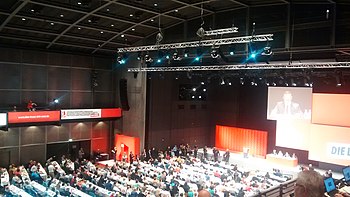
Federal Party Congress 2015 in Bielefeld.
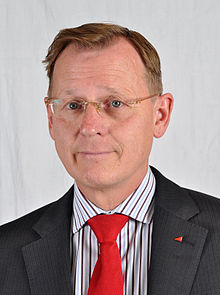
Bodo Ramelow, Prime Minister of the Free State of Thuringia
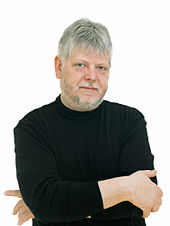
Helmuth Markov, Deputy Minister President in Brandenburg (2009 to 2014)
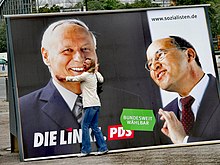
Election poster of Die Linke.PDS with the top candidates Oskar Lafontaine and Gregor Gysi on the occasion of the Bundestag election campaign 2005.
Transition logo of the WASG before the fusion
Transition logo of the PDS before the merger
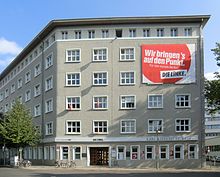
Karl Liebknecht House The house was first owned by the KPD (seat of the Central Committee), later by the SED. Today it is the party headquarters of The Left Party
Search within the encyclopedia